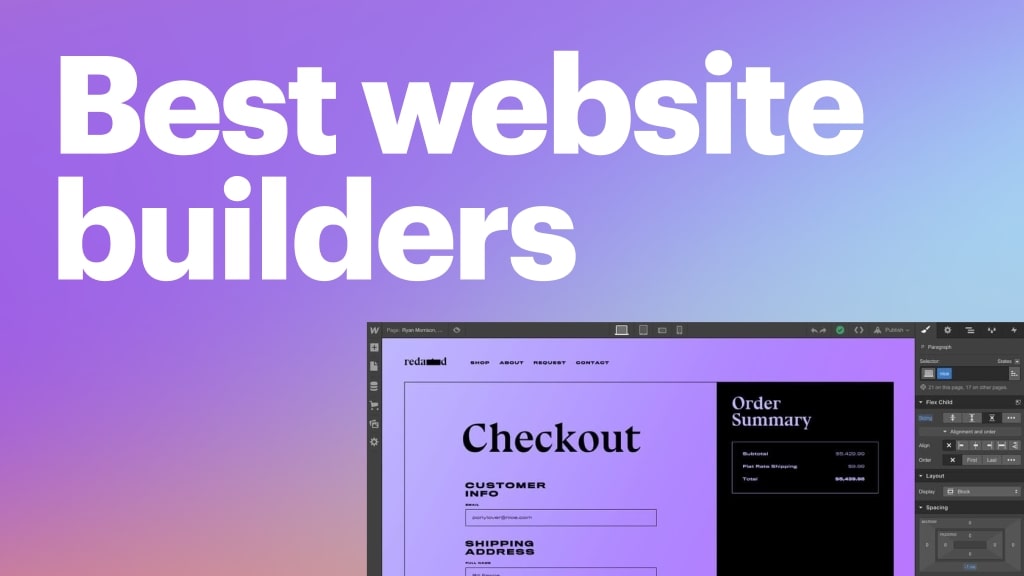Did you know that 71% of U.S. small businesses now have a website? With projections showing the website builder market will reach $7.88 billion by 2030, selecting the right platform is no longer optional—it’s a strategic imperative. Whether you’re a coffee shop owner or a freelance designer, your digital storefront can make or break customer trust. This guide cuts through the noise to reveal which website builders deliver real results, why AI-driven tools are revolutionizing the industry, and how to avoid costly mistakes 38% of businesses still make.
What Defines the “Best” Website Builder for Small Businesses?
A website builder is a tool that allows users to create and customize websites without coding. The ideal platform balances ease of use, affordability, and scalability while offering industry-specific features. Historically, businesses relied on costly developers ($6,760 average fee) or basic tools like 1994’s GeoCities, which limited users to single-page sites. The 2006 launch of Wix and Weebly introduced drag-and-drop editors, reducing development time from weeks to hours. Today, AI-powered builders like B12.io design professional sites in minutes, as seen with law firm Atlas Law and HR consultancy Envision HR.
Critical Features Every Small Business Needs
1. Mobile-First Design
85% of consumers browse on smartphones, yet 44% of sites still use generic templates that look unprofessional on smaller screens1. Top builders like Wix and Squarespace solve this with:
- Breakpoint Editors: Adjust layouts for specific devices.
- Accelerated Mobile Pages (AMP): Boost loading speeds by 3x.
- Responsive Image Scaling: Automatically optimize visuals.
Mortgages by Jill saw a 300% loan increase after switching to B12’s mobile-optimized design, proving responsiveness directly impacts revenue.
2. E-Commerce Capabilities
For product-based businesses, Shopify remains unmatched with:
- Multi-Channel Sales: Sync inventory across Amazon, Instagram, and POS systems.
- Subscription Models: Recurve saw a 25% revenue boost using Shopify’s membership tools.
- Tax Automation: Calculate rates for 10,000+ jurisdictions.
However, Web.com’s 50-product limit on its $4.95/month plan suits microbusinesses testing online sales.
3. SEO and Analytics
Wix’s AI meta tag generator and Semrush integration helped a bakery in Austin rank #1 for “artisan croissants” within 90 days. Key tools to demand:
- Automatic Sitemaps: Ensure search engines crawl all pages.
- GA4 Compatibility: Track user behavior in real-time.
- Keyword Tracking: Monitor rankings without third-party apps.
Top 5 Website Builders for Small Businesses in 2025
1. Wix: The All-Rounder
- Pricing: $16/month (Core Plan)
- Strengths: 500+ industry-specific templates, AI logo generator, built-in CRM.
- Case Study: A Brooklyn florist increased wedding inquiries by 140% using Wix’s SEO Assistant and booking tools.
2. Shopify: E-Commerce Powerhouse
- Pricing: $39/month (Basic)
- Strengths: Abandoned cart recovery, 100+ payment gateways.
- Stat: 4.4 million merchants use Shopify, processing $444 billion in sales.
3. B12: AI-Driven Efficiency
- Pricing: Custom (Starts at $199/month)
- Strengths: Human-assisted AI design, client intake forms.
- Result: Matten Law doubled its client base using B12’s automated scheduling.
4. Squarespace: Design Excellence
- Pricing: $23/month (Commerce Plan)
- Strengths: Award-winning templates, built-in email marketing.
5. Web.com: Budget-Friendly Starter
- Pricing: $4.95/month
- Best For: Service businesses needing basic sites quickly.
Emerging Trends Shaping Website Building
AI Personalization
Wix’s 2024 AI analyzes user behavior to dynamically adjust CTAs, increasing conversions by 18% for early adopters. Expect:
- Predictive Layouts: Tools that reformat sites based on traffic sources.
- Content Generators: Auto-write product descriptions in your brand voice.
Web3 Integration
Platforms like Webflow now support:
- NFT Galleries: Display digital art collections.
- Blockchain Hosting: Decentralized storage via IPFS.
Cost Comparison: Maximizing ROI
Platform | Starting Price | Key Inclusions | Best For |
Wix | $16/month | 50GB storage, SEO tools, analytics | Growing service businesses |
Shopify | $39/month | 2 staff accounts, POS integration | Product-based startups |
B12 | $199/month | AI design, client management | Professional services |
Web.com | $4.95/month | Free domain, basic e-commerce | Budget-conscious solopreneurs |
FAQs: Addressing Common Concerns
“Can I switch builders later without losing data?”
Yes, but proceed cautiously. While Wix and Squarespace allow ZIP file exports, recreating complex functionalities (e.g., Shopify’s inventory system) on another platform may require developer help.
“Are free plans viable long-term?”
One.com’s Basic plan (free with hosting) restricts sites to 1 page—sufficient for a portfolio but inadequate for scaling. Invest in at least a $16/month plan for growth features.
“How do I ensure GDPR compliance?”
Choose builders with auto-generated cookie banners like Wix or Squarespace. B12’s clients avoided $50k+ fines using its built-in compliance tools.
Final Thoughts: Build Smarter, Not Harder
The best website builder aligns with your business stage: Web.com for bootstrapped solopreneurs, Wix for scaling service providers, Shopify for product innovators. As AI and Web3 redefine possibilities, prioritize platforms offering regular updates and 24/7 support.
Ready to launch? Start your 14-day free trial with Wix or book a B12 demo to experience AI-driven design. Share this guide with fellow entrepreneurs—your next client might find you through a perfectly optimized site.





